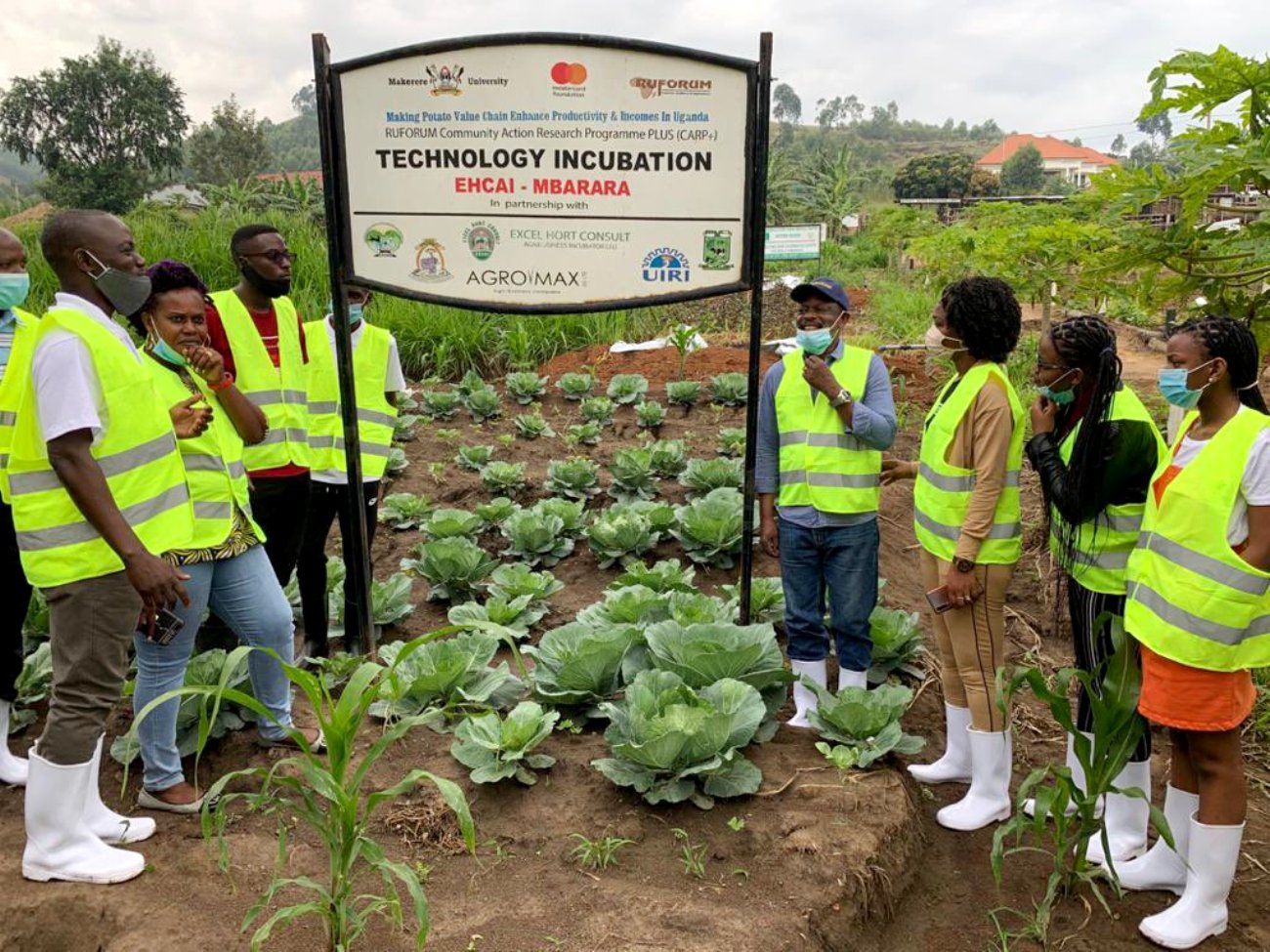The African Agribusiness Incubators Network [AAIN] and the London College of International Business Studies [LCIBS] have entered into a creative collaborative working partnership in the design and delivery of a truly innovative programme embracing training in entrepreneurship-small business management and business incubation management. An innovative provision that transcends and challenges existing mundane, textbook-derived approaches to fulfilling the start-up and development support needs of micro and small enterprises.
Whilst the case is frequently made for small businesses being the engine room of the economy, we at AAIN-LCIBS argue that neither the distinctiveness of small business vis-à-vis large companies or the complexity of the small business management task are fully grasped by many of those working to encourage and support small firm start-up and development. One key corollary of this is that it is often assumed the small business can be merely treated as a ‘little big business’ and thus that traditional textbook contained large company management models and approaches can be watered down and be of practical use for the small enterprise. We at LCIBS-AAIN draw upon the synergy of our depth of understanding of small business and challenge such superficial treatment of micro and small enterprise support.
State of Agribusiness Incubation in Africa
From 2012 to the present day, the AAIN incubation work and studies, mapping the incubation ecosystem in the continent has become pivotal in keeping track of the ever-increasing role incubation, innovation; technology commercialization, mentorship and entrepreneurship play in African economies. Business Incubation centres and Tech hubs are today efficient vehicles not only in supporting African governments create jobs and employment for the youth but also in attracting capital and expertise for domestic private sector development and SMEs growth, leading to economic transformation.
AAIN research for business development carried out in mid-2018 shows that since 2010 the number of active specialized agribusiness incubators, accelerators and tech hubs across Africa has grown by over 70%: from 105 in 2010. 345 mixed incubators, accelerators and small-scale hubs are now more active on the continent and the list is growing day by day; and more are to be launched during the AAIN conference 14th to 16th August 2019. Over 1600 incubation management mentors have been profiled to support emerging business, over 400 experts trained in business incubation management and 2500 start-ups profiled and ready for incubation support, growth and acceleration using the incubation model in Africa. However, incubators and accelerators still face a multiple of challenges including, but not limited to, lack of professional experts in business incubation management, limited financial products and services, a lack of national and regional defined incubation policy direction and limited infrastructure to accommodate and support emerging start-ups – more especially youth and women in the agriculture sector and in the area of ICT.
AAIN-LCIBS are collaboratively working to offer microenterprise and small business support which addresses their specific development needs. The following sections highlight AAIN-LCIBS perspectives on and approaches to such small business support provision.
The Paradox of Smallness of Operation
Small businesses are potentially well placed to seize and exploit development opportunities because of distinct benefits deriving from size and form of operation vis-à-vis large companies, including closeness to the customer, less bureaucracy, faster decision-making, flexibility and adaptability.
However, we at AAIN-LCIBS proffer that such benefits are not absolute – they have to be worked for and earned. Their realisation is often constrained by a multitude of limitations which are similarly small size-derived. Indeed, small businesses are a potential unique problem-type. They face distinct problems such as difficulty attracting high quality, reliable workforce; lack of collateral and profit track record restrict access to reasonable cost finance, and absence of large company marketing budgets and expertise constrain identification of an effective communication with potential customer bases. Crucially, time, resource and ability constraints mean that relating to the highly uncertain external environment is extremely problematic.
It is clear that here we have a paradox. On the one hand, able and highly ambitious microenterprise and small business owner-managers have real potential to exploit possible benefits of the smallness of operation and make a significant contribution to the economy. On the other hand, however, that same state of smallness can impose severe constraints that restrict owner-managers from realising small business development potential and even survival.
Responding to Shortfalls in Small Business Support
It is also clear would-be entrepreneurs that and a great many ambitious growth-seeking owner-managers need help. One can certainly find pockets of first-class supportive input – for example, in some business school entrepreneurship programmes and slivers of relevant management training provision. However, much of the effort designed to support small business development falls well short of its potential.
For instance, in many cases small business support provision has:
- Encountered difficulties effectively engaging with owner-managers;
- Not met actual development needs – frequently relying upon large company-oriented content;
- Offered, in the eyes of many entrepreneurs, very poor value;
- Encountered owner-manager suspicion of academics and external assistance
But probably the most significant shortfall in the design of small business support is a failure to recognise that the external environment is so uncertain and even hostile that successfully growing small businesses have to ‘learn their business along’. Formal and large company oriented management models and tools are inappropriate for the small business which in order to succeed orients toward informal, idiosyncratic management processes and frequently creates its own subjective in-context management knowledge.
In short, success in small business development rests predominantly on the owner-manager willingness and ability to progressively become an ever more effective and resilient learner. But traditional educational and training provision designs do not reflect how entrepreneurial small business owner-managers actually learn: there is a mismatch between learning designs and entrepreneurial learning needs of growth-seeking owner-managers.
We at AAIN-LCIBS respond to these shortfalls – with academically rigorous and practically relevant entrepreneurship and small business development support that:
- Draws upon state of the art small business management knowledge – thus, highly relevant content
- Gives real focus to the entrepreneurial learning process: how successful entrepreneurs learn
- Fosters an aptitude for coping with the unpredictable external environment – emphasising that this aptitude can itself be learned
Business Incubation Management, Small Business Management, and Entrepreneurship trainings offered by AAIN and LCIBS are creating skills, competencies, knowledge and connections between incubation management experts, incubators accelerators, tech hubs, organizations and national governments and in so doing are unleashing dramatic opportunities for job and employment creation in Africa.
However, unless African incubators and nations create the right ecosystems, conditions for start-up and SME business progress and invest in industry and innovation while building state capacity and skills, there is a risk that a further digital divide opens up between digital natives and digital migrants. Thus there is a need to focus efforts on making incubators and accelerators sustainable as well run at the same speed across the board and responsive to today’s demands and emerging economies for tomorrow.
In Africa, a number of nations have begun to embrace incubation and technology commercialization in close partnership with AAIN and its associates including UBI Global. For example Kenya, Ghana, Rwanda, Nigeria, Botswana, South Africa, Tunisia, Egypt, Burundi, Benin, Senegal, Uganda, Tanzania, Zambia, Ethiopia, Morocco and Malawi are countries that are actively developing models for business incubation and start-up support focused on youth and women – using incubation models and taking advantage of such as ICT based technologies and entrepreneurship promotion.
Incubation Management Training and Exposure of Experts from Kenya at Uganda Industrial Research Institute (UIRI) a partnership between AAIN, LCIBS and Kenya Government
Across the continent, there are numerous other incubation efforts and examples of such innovations already changing lives, and in a region bursting with youth, many young people are quickly adopting and adapting technology to suit their own business needs, as well as those of their nations.
The AAIN-LCIBS Entrepreneurship-Small Business Management and Incubation Management Programmes
We at AAIN-LCIBS have developed two three-day programmes: the Entrepreneurship and Small Business Management Training Programme; and the Introduction to Business Incubation Management Programme. Each combines relevant academic small business management knowledge, expert tuition and coaching – and an option for follow-up mentoring after programme attendance. We focus on fostering small business development knowledge and management abilities and the nurturing of resilient entrepreneurial learning through interactive Workshops that utilise the real world agribusiness development context and live case studies as learning vehicles.
Our approach to such learning and development support provision recognises that entrepreneurs learn both independently and vicariously. We bring together like-minded would-be entrepreneurs, growth-seeking owner-managers and those involved in small business development or support in the workshops to facilitate their learning from each other and from the coaching inputs from our entrepreneurship and incubation management specialists.
Senegal Joint Partnership Meeting between AAIN, LCIBS, NEPAD and UIRI, March 2018
During the partnership meeting Prof Peter Wyer Dean LCIBS, Dr Ariho Alex CEO AAIN, Fait N’zi-Hassane Head of Skills Development initiative in Africa at NEPAD and Prof Charles Kwesiga ED UIRI reaffirmed their institution commitment towards small business development and incubation support as a priority for African development and efforts towards job creation for the youth.
We also recognise that entrepreneurial learning takes place in context – and thus utilise the owner-managers own businesses as key learning vehicle [and the small business support work contexts of those participants who support providers]. For instance, we use the participant owner-managers’ specific small business problems as ‘learning frames’ for solution finding and associate development. Recognising also that growth achieving entrepreneurs learn through doing; dealing with crisis; undertaking ‘try out’ and experimentation; and ‘trying on for size’ the perspectives and worldviews of those on the boundaries of the firms activities, we nurture course participants as resilient, more effective learners able to maximise own learning on return to their work contexts.
Moreover, we ensure our programme content reflects the practical needs of owner-managers and support providers. We customise content through combining our own-researched ‘best small business management’ knowledge bases, our rich in-depth practical small business development and business incubation management experience bases and those areas of existing broader specialist [textbook contained] management knowledge that has small business relevance.
If you are an ambitious would-be entrepreneur, a growth-seeking owner-manager of a micro or small enterprise or involved in the provision of support of such enterprises, join us on our next Entrepreneurship and Small Business Management Programme and/or Business Incubation Management Programme – and truly build state of the art small business management knowledge and entrepreneurship capabilities.
Looking into the future LCIBS, AAIN and UBI Global, among other associate partners, will continue to support growth and development of small businesses and incubators through skills development and capacity strengthening through transformative education under a new initiative called Instart Africa.




